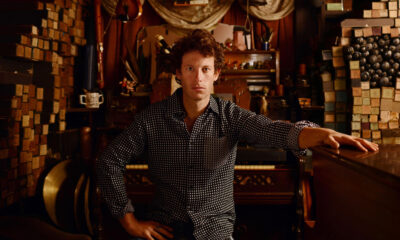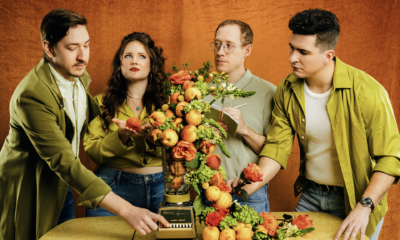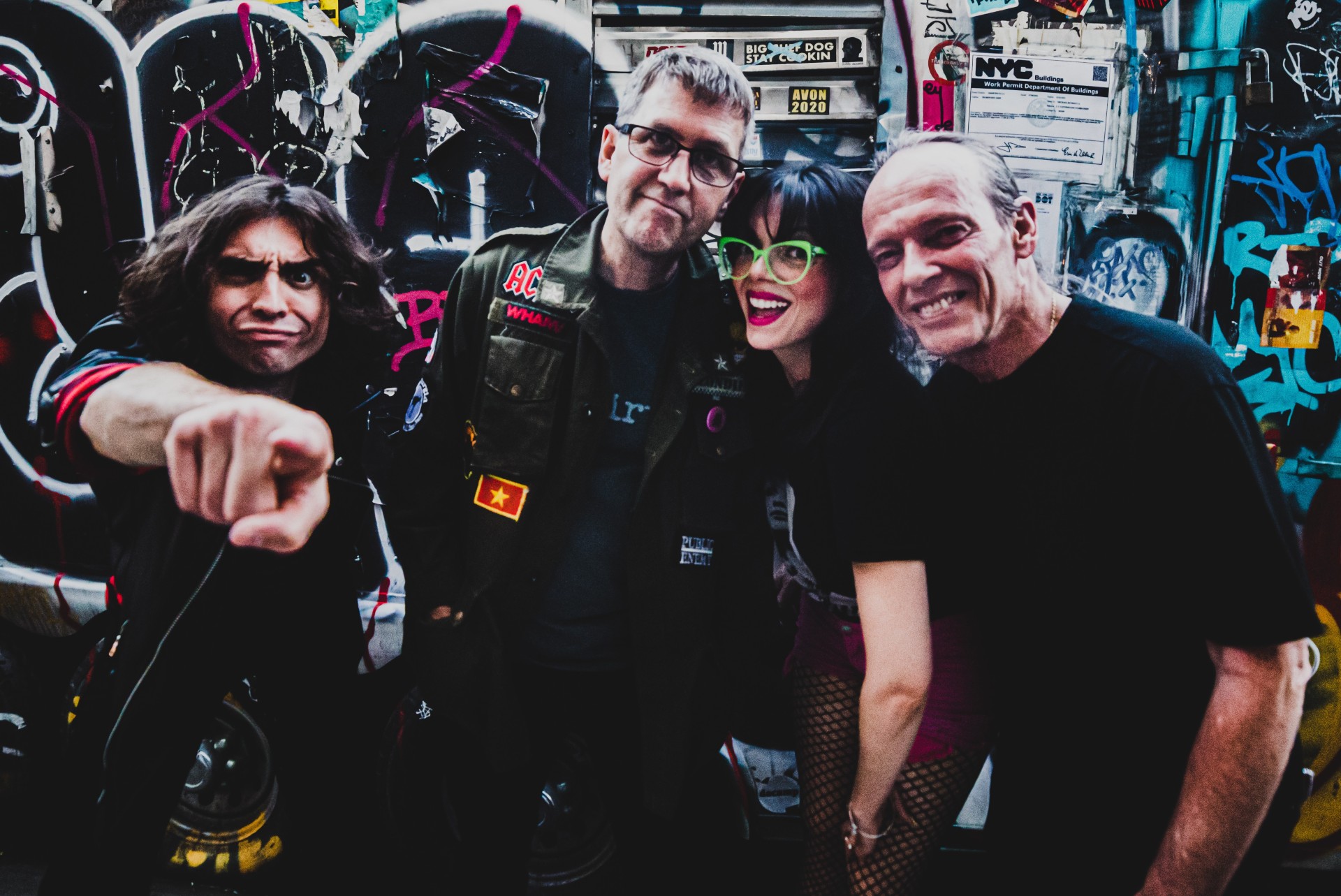Interviews
Interview with Demians mastermind and musiciain Nicolas Chapel
I recently had the opportunity to speak with Nicolas Chapel from the alt-rock/experimental band Demians about their latest disc, Mute. This is a solid, enjoyable album with tracks that are vibrant, fresh and extremely entertaining. Mute is not your typical rock record though, as It’s deeply contemplative, at times experimental and layered with emotion very different from anything else in the scene. Here’s what Chapel had to say about Mute.

I recently had the opportunity to speak with Nicolas Chapel from the alt-rock/experimental band Demians about their latest disc, Mute. This is a solid, enjoyable album with tracks that are vibrant, fresh and extremely entertaining. Mute is not your typical rock record though, as It’s deeply contemplative, at times experimental and layered with emotion very different from anything else in the scene. Here’s what Chapel had to say about Mute.
The name of the band Demians is interesting to say the least and sounds as if there is a story behind it. Where did the name come from and what is the story?
Nicolas: It goes back to when I was a youngster and found Hermann Hesse’s “Demian” in my grandfather’s books. The character of Max Demian had a huge impact on me. He never tells the other characters what to do; he only interacts with them to let them figure things out by themselves. This is exactly the way my songs appear to me, they just happen, they’re just there in my head and the way I record them and learn through them is more than just music to me. When starting this project I didn’t want a band name because there was no band, and didn’t want to put my own name because putting the lights on me is not what this is all about; so I chose this name for the songs, they are Demians.
Now that your brand new CD, Mute, is complete how do you feel about it? Are you satisfied with the outcome?
Nicolas: It’s been out for around six months now and I still listen to it on a regular basis, while I just couldn’t stand listening to the previous record when it came out. Mute is probably the best thing I’ve ever created. I loved the reactions towards the album, I loved it when people liked it, and loved it when people hated it. It’s raw, truly emotional in a pure and honest way, and i can definitely hear who I was when I recorded it, with both my strengths and weaknesses as a musician and as a human being. Finally being able to be myself in a record was liberating, and there are so many things to be done now.
What can fans expect when they pick up a copy of Mute?
Nicolas: As corny as it sounds, they can expect the unexpected, because I’d not be able to sum up this record in a sentence or five. No two songs sound alike. When the record came out I really loved how much people were surprised and very often didn’t know how to feel when listening to the record. It probably takes some time to sink in, but most of all it’s an album made of dynamics and contrasts. Life is not just about feeling good or bad, about being happy or being sad, about black or white. Most of the time you have no idea how you should feel, everything happens at once, and this record is my attempt to recreate that.
What is it that gives you inspiration when writing lyrics and is there a theme or themes behind the writing of Mute?
Nicolas: Most of what obsessed me when writing and recording Mute was communication between people, trying to connect with people or with yourself. There is no concept; it’s a no-bullshit record. We’re all connected in some way, whether we want it or not, people are like antennas receiving and sending info throughout their life, and this record is like what you’d hear if you were listening to my own radio station. Obviously, a lot of the things that happened after the release of my first record inspired the imagery on this album, too. This record is a direct reaction from me to what happened with the first record. This record didn’t please me and didn’t represent who I was when it came out, so I sometimes had very violent feelings when people loved it. On Mute, which came out five weeks after the completion of the recordings (couldn’t have been quicker), there is this state of emergency, there is this rawness and there is this feeling that everything could fall apart at any time, which really makes me proud of it because it was perfectly the way I felt when creating it.
Are there any tracks on the disc that are personal favorites or that have good stories behind them?
Nicolas: All these songs have a lot of personal background going on. “Maybe Hesitation Waltz” would come to mind first, because that was the first time somebody else played on one of my songs, my live drummer Gaël made a drum duet with me during the sessions and we enjoyed working together very much. The noise and the thunder made by the drums at the end is so close to what I originally heard in my head it’s almost scary. “Falling From The Sun” is a personal favorite because it’s the song that gave me the will to do this record, the very first one I wrote for it. Three chords on the piano, one take for the vocals, it couldn’t have been purer. I’m directly talking to the music, which has been the most important thing in my life. I had lost something, some of the fun and joy of playing music, during the period of time while I was trying to create a live band. That was the most painful two years of my life, and instead of being happy about playing music, all I could see was the pain in the ass, the time wasted trying to find musicians for a band, everything that’s unrelated to music. And then this song came out of nowhere, and made me feel like I had something to say once again.
How quick are you in the studio? Can you usually knock things out in a couple takes?
Nicolas: I like to do it quick, and most of what is on the record is first takes. And it’s not just a way of saying things, really first takes. For example, on “Porcelain,” I was still in the process of writing the lyrics, but the will to record the vocals came spontaneously so I grabbed the microphone and sang and kept the take. After what people call the “guitar solo”, I have no idea of what I’m singing, there was no lyrics yet at the time. But I decided to keep the take, because I felt it was something special. I like it raw and direct, cathartic, and I don’t try to put too much meaning into what I do in order to not kill it. I don’t like it when musicians or artists or whatever try to act like they’re smarter than they really are, conceptualizing everything and trying to make things fit. I don’t care if things fit or if they make sense. To me, goosebumps is where it’s at!
Do you decide on a suitable sound fairly quickly, or do you tend to tweak tones obsessively?
Nicolas: I can be really obsessive on things, but I separate things, really. Like when I’m working on a guitar tone, I can spend a lot of time changing the place of the microphones, trying different mics or stuff. But it’s all a matter of finding the right spot, and then boom! I really hit my guitars or my drums hard. For the guitars, all the knobs on the amp were in the middle, as long as it sounds good in the room I don’t go any further. I just spend a lot of time placing the microphone, but then won’t touch anything and all the nuances will come from the playing. I usually keep first takes and don’t put too much thought into it, and most of all I never let the technical aspects of a recording session overwhelm the music. If it’s recorded with a cheap mic, I don’t care as long as it contributes to the song.
What’s your musical background?
Nicolas: I’ve been self-taught for everything I do. Just listening to a lot of music, and trying to use instruments in a way that I like. I’m average in every instrument I play. As long as what I play fits the song, I don’t mind, I’m only interested in the bigger picture. Another thing is that in everything I do, I never “know”. I think there’s nothing worse than “knowing”. I’ve met hundreds of sound engineers who told me they “knew” how to place a mic, or drummers saying “you can’t do that” or “you have to do that”. Once again, there are no rules, and the reason why I play everything in my music is because this way everything is possible. Every time I sit down in front of a piano, it feels like playing a brand new video game! You have no idea where you’re going, so it remains exciting!
What is the toughest lesson you ever learned in the studio?
Nicolas: Never do any cabling while the cat is around.
Do you have any touring plans?
Nicolas: Not for this record. We wanted to tour, first, but never wanted to tour at all cost or take every tour offer that we’d get. We want to tour with other bands that we like. This band really never fits anywhere, you have to be creative to get this band on the road with a band that’s appropriate, and the touring people around the band ended up being not creative at all. So no, we’ll tour for the new album which I’ll start recording very soon, and we’ll handle these things by ourselves this time. The main reason why we’re not touring right now is because we’re all involved in different things.
I’m working a lot for movie scores and for producing other artists in my country, and stuff like that which is really stimulating and exciting right now for me. But Demians is a real family, and everyone involved in the band can’t wait until we go back on tour with these songs that we really love.
Will you be hiring a band or do you have one that tours with you?
Nicolas: Demians is a real unit now. Which means that even though I’m dealing with my albums myself, the people involved in the live band have been the same for years. There’s Gaël Hallier on the drums, Antoine Pohu on the bass guitar, and Fred Mariolle who plays the guitar, and Ii sing, play the guitar, and the piano on a couple of songs.
What artists would fans be surprised to find on your iPod?
Nicolas: I have no idea; I’m pretty open minded so I believe anyone with an open mind would understand why my iPod is filled with so many different things. Maybe the fact that I have so much experimental music? I listen to tons of stuff like Alva Noto, Jon Hopkins, Einsturzende Neubauten, or stuff from Nils Frahm or Max Richter. I don’t know, as long as you’re not running away screaming because I listen to Fiona Apple as much as I listen to IAMX or DJ Shadow or Apparat, nothing will surprise you.
Tell me about a book or two that you’ve read that you think other people should read?
Nicolas: The latest one that I really enjoyed reading was “The Raw Shark Texts” by Steven Hall. The topic was a really personal one for me, and I loved the way he handled it. I can’t say more than that, really, everyone will see it under a different light, depending on your experience.
If you had not become a musician what other career path would you have liked to attempt?
Nicolas: I still have a hard time talking about a “career” when people say I’m a musician. To me, I’m just an average guy who spends all his time playing music, so I guess nothing else could have happened. I play many instruments, I really love production works I love recording other musicians, I love singing what I have on my heart but don’t feel like a singer, I love taking pictures and painting and just creating stuff. Right now I’m even soldering my entire new studio myself, just because i enjoy doing it. Just being “there” is a career in itself, when you enjoy what you do.
What three words best describe your band?
Nicolas: Raw, emotional, honest.
If you were a superhero, who would it be and why?
Nicolas: Superheroes are overrated… I’m not even talking about these horrendous tight pants they wear, most of the time. I tend to find the villains far more interesting.
Any closing words?
Nicolas: Mute is not about me. Take it in your iPod, go for a walk, mute the noise of the outside world and let the record talk to you. Now it’s all about you. [ END ]
-

 Music3 days ago
Music3 days agoTake That (w/ Olly Murs) Kick Off Four-Night Leeds Stint with Hit-Laden Spectacular [Photos]
-

 Alternative/Rock5 days ago
Alternative/Rock5 days agoThe V13 Fix #010 w/ High on Fire, NOFX, My Dying Bride and more
-

 Hardcore/Punk2 weeks ago
Hardcore/Punk2 weeks agoHastings Beat Punks Kid Kapichi Vent Their Frustrations at Leeds Beckett University [Photos]
-

 Culture2 weeks ago
Culture2 weeks agoCirque Du Soleil OVO Takes Leeds Fans on a Unique, Unforgettable Journey [Photos]
-

 Alternative/Rock1 week ago
Alternative/Rock1 week agoA Rejuvenated Dream State are ‘Still Dreaming’ as They Bounce Into Manchester YES [Photos]
-

 Features3 days ago
Features3 days agoTour Diary: Gen & The Degenerates Party Their Way Across America
-

 Culture6 days ago
Culture6 days agoDan Carter & George Miller Chat Foodinati Live, Heavy Metal Charities and Pre-Gig Meals
-

 Music6 days ago
Music6 days agoReclusive Producer Stumbleine Premieres Beat-Driven New Single “Cinderhaze”












